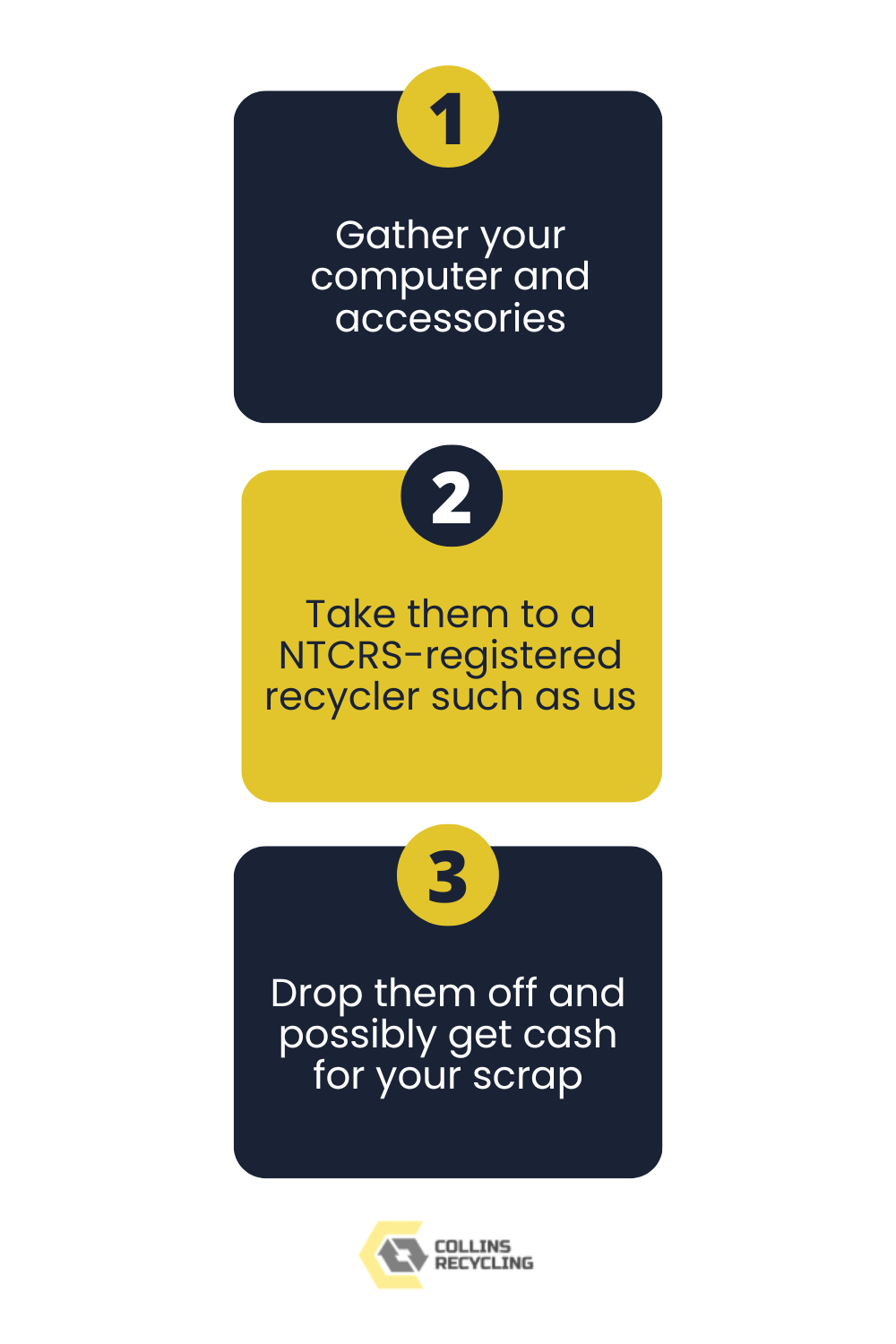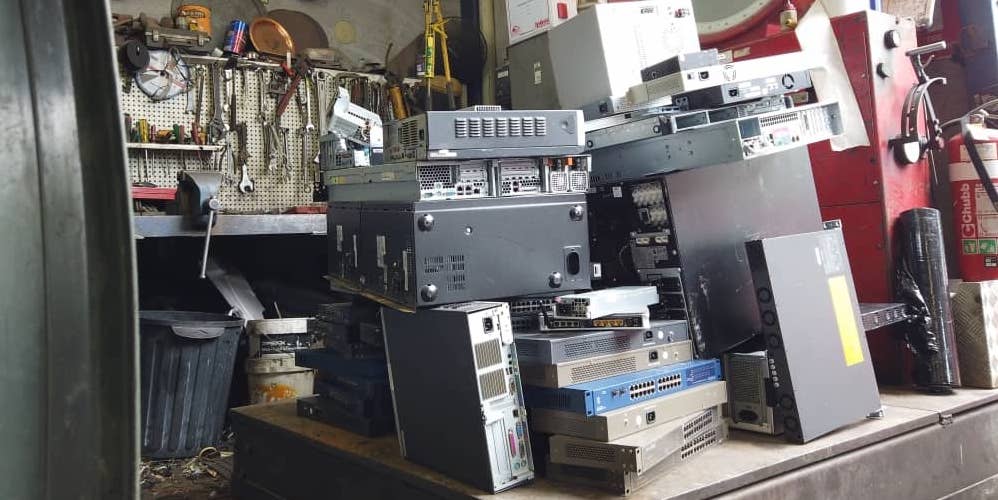It may be surprising to learn that Australia is one of the world’s leaders in using new technology.
Every year, Aussies buy around five million new computers which will inevitably be replaced with newer technology in the near future and become e-waste.
You’re probably wondering “how do I recycle my old computer”? To answer this, I’ve laid out the crucial steps below.
Quick Guide to Computer Recycling
- Drop-Off or Collection: Bring your computer to us or arrange a collection.
- Data Security: Your data is securely wiped or destroyed to protect your privacy.
- Sorting: Computers are assessed for refurbishment or recycling and sorted accordingly.
- Dismantling: Components are carefully disassembled, and hazardous materials like batteries are safely removed.
- Recycling: Metals, plastics, and electronic parts are processed for reuse.
- Safe Disposal: Hazardous materials such as lead, mercury, and cadmium are disposed of responsibly.
- Final Processing: Remaining materials are further processed to minimise waste.
Please note: Proof of ID is required for payment.
How Do I Recycle My Old Computer or Laptop?

We are proud to be one of the leading recycling locations in Perth and offer cash for your scrap when you recycle with us.
Our recycling service can help you recycle all computer-related accessories, including:
- Chargers
- Computer Cables
- Computer Mice
- Hard Drives
- Keyboards
- Laptops
- Monitors
- Motherboards
- Printers
- Scanners
- Webcams
If getting your recyclables to our location is difficult, you can give us a call to arrange a collection from your home. Get in touch today!
How to Prepare Old Computers for Disposal
To prepare a computer for recycling, I recommend ensuring that your data is wiped.
You may already know that your computer holds on to information even after you hit the delete button. So, removing this data is necessary if you do not want your personal information to end up with strangers.
Below, I’ve laid out the steps you can take to protect your data and purge your computer.
1. Backup Your Files
Start the process of backing up your files with the most sensitive and vital information you have and move on from there.
If you have a great deal of data, you may want to consider backing up files on an external hard drive. Using cloud storage for this information is another popular option for backed-up information.
2. Erase Sensitive Information
This may sound like a boring task, but I recommend doing this to keep your information private. Essentially, it boils down to three steps:
- Delete browsing history and uninstall all programs: Some programs like Microsoft Word, Excel and PowerPoint have catalogued your personal information, like name, address, and email, without you knowing it. Eliminating the program cuts off one path that is valuable to hackers to access your personal data.
- Use data scrubbing software, encrypt the drive, and overwrite deleted files: An empty Recycle Bin on your computer does not guarantee that your information is totally gone. Because hackers are so sophisticated, you need to stay a few steps ahead of them to ensure your digital safety and protect your privacy. Fortunately, a number of programs exist to help you with this.
- Physically demolish the hard drive: I understand this may seem extreme. However, when you consider the fact that computer hard drives never forget information and hackers are exceptionally skilled, this is the best way to be sure your data is safe.
3. Double Check Sign Outs
A final precaution to be sure you are protected is to check and see if you have signed out of all programs and unpaired your devices.
FAQs
Why should I recycle my old computer?
There are several reasons why recycling old computers is essential.
- Older-style monitors have cathode ray tubes (CRT) which contain lead. Proper disposal of these is essential.
- Finite resources are wasted when computers end up in landfills. Metals such as tin, nickel, zinc, and copper are used in computers and are non-renewable.
- Chemical compounds used in computers can leach into the groundwater and soil. These mixtures poison the environment, harming all living things that come in contact with the polluted soil or water.
Is it legal to toss electronic waste in a regular trash bin in Western Australia?
Starting in 2024, electronic waste will be banned from landfills in WA. This move is seen as necessary after the Department of Water and Environmental Regulation (DWER) reported that around one-quarter of the 68,663 tonnes of Western Australia’s e-waste is recycled.
What items are considered e-waste?
There are dozens of everyday objects that fall under the heading e-waste. Our simplified definition- e-waste is anything that has a battery, plug, or cord that is not useful to you. Computers, phones, tablets, smart appliances, and many other products are categorised as e-waste and must be recycled.
What happens to my old computer when it gets recycled?
Almost every bit of old computers can be recycled.
The process of dismantling your computer has a number of steps, all aimed at recovering valuable materials. By using automated processes, the glass, plastic and metal components are broken down into units that can be reclaimed. This decreases the need to begin new mining projects to find more of these materials to build newer technology.
Additionally, many of the recycled materials are valuable to other industries. One example is the space industry, which requires a great deal of various metals reclaimed from old computers.
Conclusion
Recycling old computers in Australia, particularly in Western Australia, is a crucial and responsible environmental practice. With the growing accumulation of e-waste due to rapid technological advancements, it becomes essential to dispose of obsolete computers properly.
Free recycling drop-off locations, along with convenient home collection services, make this process accessible and straightforward for everyone. By participating in computer recycling, Australians not only contribute to environmental conservation but also support the recovery of valuable materials that can be reused in various industries, thus fostering a more sustainable future.
Moreover, the importance of data security in the recycling process cannot be overstated. Taking steps to backup, erase, and physically destroy sensitive data ensures personal information safety and addresses privacy concerns. The impending legal changes in Western Australia, prohibiting e-waste in landfills from 2024, highlight the urgency and necessity of adopting proper recycling habits.
Myself and my team are fully committed to providing sustainable, environmentally-friendly solutions to waste-related issues and are here to recycle your scrap effectively and answer any questions you might have. Get in touch today!








